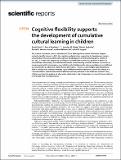Files in this item
Cognitive flexibility supports the development of cumulative cultural learning in children
Item metadata
| dc.contributor.author | Davis, Sarah | |
| dc.contributor.author | Rawlings, Bruce | |
| dc.contributor.author | Clegg, Jennifer M. | |
| dc.contributor.author | Ikejimba, Daniel | |
| dc.contributor.author | Watson-Jones, Rachel E. | |
| dc.contributor.author | Whiten, Andrew | |
| dc.contributor.author | Legare, Cristine H. | |
| dc.date.accessioned | 2022-08-19T11:30:14Z | |
| dc.date.available | 2022-08-19T11:30:14Z | |
| dc.date.issued | 2022-08-18 | |
| dc.identifier | 280942845 | |
| dc.identifier | 33baed1a-fb7c-43e0-828f-843092027fe8 | |
| dc.identifier | 85136089875 | |
| dc.identifier | 000841942700081 | |
| dc.identifier.citation | Davis , S , Rawlings , B , Clegg , J M , Ikejimba , D , Watson-Jones , R E , Whiten , A & Legare , C H 2022 , ' Cognitive flexibility supports the development of cumulative cultural learning in children ' , Scientific Reports , vol. 12 , 14073 . https://doi.org/10.1038/s41598-022-18231-7 | en |
| dc.identifier.issn | 2045-2322 | |
| dc.identifier.other | Jisc: 539792 | |
| dc.identifier.other | publisher-id: s41598-022-18231-7 | |
| dc.identifier.other | manuscript: 18231 | |
| dc.identifier.other | ORCID: /0000-0003-2426-5890/work/117567909 | |
| dc.identifier.uri | https://hdl.handle.net/10023/25865 | |
| dc.description | Funding: This research was supported by a National Science Foundation grant (award number 1730678) and a Templeton World Charity Foundation grant (award number TWCF0312) grant awarded to CHL. This research was also supported by grant, P2CHD042849, awarded to the Population Research Center at The University of Texas at Austin by the Eunice Kennedy Shriver National Institute of Child Health and Human Development, and grant ID 40128 from the John Templeton Foundation to AW and Kevin Laland. | en |
| dc.description.abstract | The scale of cumulative cultural evolution (CCE) is a defining characteristic of humans. Despite marked scientific interest in CCE, the cognitive underpinnings supporting its development remain understudied. We examined the role cognitive flexibility plays in CCE by studying U.S. children’s (N = 167, 3–5-year-olds) propensity to relinquish an inefficient solution to a problem in favor of a more efficient alternative, and whether they would resist reverting to earlier versions. In contrast to previous work with chimpanzees, most children who first learned to solve a puzzlebox in an inefficient way switched to an observed, more efficient alternative. However, over multiple task interactions, 85% of children who switched reverted to the inefficient method. Moreover, almost all children in a control condition (who first learned the efficient method) switched to the inefficient method. Thus, children were keen to explore an alternative solution but, like chimpanzees, are overall conservative in reverting to their first-learned one. | |
| dc.format.extent | 12 | |
| dc.format.extent | 1408460 | |
| dc.language.iso | eng | |
| dc.relation.ispartof | Scientific Reports | en |
| dc.subject | BF Psychology | en |
| dc.subject | DAS | en |
| dc.subject | MCC | en |
| dc.subject.lcc | BF | en |
| dc.title | Cognitive flexibility supports the development of cumulative cultural learning in children | en |
| dc.type | Journal article | en |
| dc.contributor.sponsor | John Templeton Foundation | en |
| dc.contributor.institution | University of St Andrews. School of Psychology and Neuroscience | en |
| dc.contributor.institution | University of St Andrews. Institute of Behavioural and Neural Sciences | en |
| dc.identifier.doi | https://doi.org/10.1038/s41598-022-18231-7 | |
| dc.description.status | Peer reviewed | en |
| dc.identifier.grantnumber | 40128 | en |
This item appears in the following Collection(s)
Items in the St Andrews Research Repository are protected by copyright, with all rights reserved, unless otherwise indicated.

